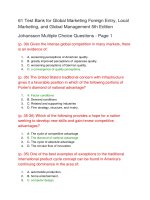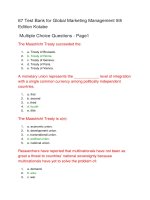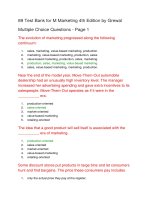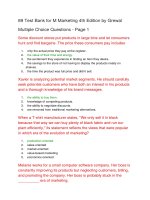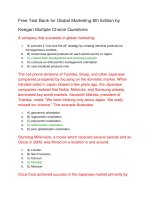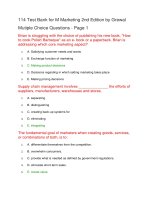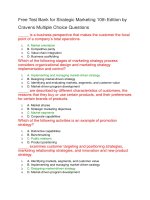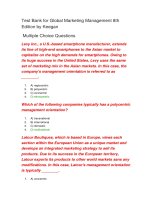Test bank for global marketing 7th edition by keegan
Bạn đang xem bản rút gọn của tài liệu. Xem và tải ngay bản đầy đủ của tài liệu tại đây (77.9 KB, 13 trang )
Test Bank for Global Marketing 7th Edition by Keegan
Mutiple Choice Questions
All of the following correctly states McDonald's approach to
standardization and adaptation of the marketing mix except:
1.
A) McDonald's standardizes some product elements and adapts others.
2.
B) McDonald's standardizes some place elements and adapts others.
3.
C) McDonald's standardizes some promotion elements and adapts others.
4.
D) McDonald's standardizes some price elements and adapts others.
5.
E) McDonald's standardizes all product elements.
Based on 2011 rankings of Fortune Global 500 companies, the
world's most valuable car company is:
1.
A) GM.
2.
B) Daimler AG.
3.
C) Toyota.
4.
D) Ford.
5.
E) Chrysler.
According to Michael Porter, a global industry is one in which
________ can be achieved by integrating and leveraging operations
on a worldwide scale.
1.
A) marketing mix
2.
B) competitive advantage
3.
C) cross border infiltration
4.
D) ration analysis
5.
E) production capability
Renault and its rivals are racing to offer middle-class consumers a
new value proposition by selling cars for the equivalent of $10,000
or less. On the heels of Renault’s success with Dacia Logan comes
the $2,500 Nano from India’s Tata Motors. This illustrates that:
1.
A) consumers are looking for low price irrespective of quality.
2.
B) Renault is overcharging for their cars compared to their competitors.
3.
C) higher product development costs are a driving force behind globalization.
4.
D) market success depends on reaching a threshold of acceptable quality for
consumers.
5.
E) cars are not very popular in emerging markets like India.
Despite the impact of the driving forces, several restraining forces
may slow a company's efforts to engage in global marketing. These
restraining forces may include all of the following except:
1.
A) management myopia.
2.
B) national controls.
3.
C) opposition to globalization.
4.
D) newcomers from emerging markets.
5.
E) organizational culture.
The essence of marketing worldwide is to surpass the competition
in creating perceived value, which can be represented as:
1.
A) Value = Price/Benefits
2.
B) Value = Benefits/Price
3.
C) Value = Benefits x Price
4.
D) Value = Benefits - Price
5.
E) Value = Benefits + Price
A person who assumes that his or her home country is superior to
the rest of the world is said to have:
1.
A) ethnocentric orientation.
2.
B) polycentric orientation.
3.
C) regiocentric orientation.
4.
D) geocentric orientation.
5.
E) no correct answer
The former chairman of Nestlé recently told an interviewer: "We are
food and beverages. We are not running bicycle shops. Even in
food we are not in all fields. There are certain areas we do not
touch. Also, we have no soft drinks because I have said we either
buy Coca-Cola or we leave it alone." What strategic marketing
principle does the chairman's comment emphasize most
specifically?
1.
A) customer value
2.
B) competitive advantage
3.
C) focus on specific food and beverages
4.
D) myopia
5.
E) policy of dealing only with Swiss businesses
Unilever, the Anglo-Dutch consumer products company, at one time
had 30 different package designs and 48 different formulations for
its Rexona deodorant brand. This is an example of:
1.
A) ethnocentric orientation.
2.
B) polycentric orientation.
3.
C) regiocentric orientation.
4.
D) geocentric orientation.
5.
E) transnational orientation.
Nestlé, Unilever, GlaxoSmithKline, and Royal Philips Electronics
can be considered transnational companies on the basis of:
1.
A) sales outside the home country to total sales.
2.
B) assets outside the home country to total assets.
3.
C) employees outside the home country to total employees.
4.
D) headquartered in a relatively small home-country market.
5.
E) all of the above
Slumdog Millionaire, a movie which received several awards and an
Oscar in 2009, was filmed on a location in and around:
1.
A) London.
2.
B) San Francisco.
3.
C) Cancun.
4.
D) Mumbai.
5.
E) Moscow.
A fundamental difference between regular marketing and global
marketing is:
1.
A) the lack of marketing mix.
2.
B) the scope of activities.
3.
C) the lack of strategic planning.
4.
D) the focus on resources.
5.
E) the lack of communication.
H.F.Iskander, general manager of Chevron's Kuwait office, stated
"Chevron is pumping oil in different locations all over the world …
there isn't a rock we haven't drilled through. We centralize all that
knowledge at our headquarters, analyze it, sort it out, and that
enables us to solve any oil-drilling problem anywhere." From the
global marketing point of view this is an example of a global
company:
1.
A) that is hungry to exploit natural resources.
2.
B) that is trying to be first to explore oil.
3.
C) that it is trying to solve world problems.
4.
D) that gains leverage through experience transfers.
5.
E) that does not have easy access to information.
When a country like China is experiencing rapid economic growth,
policymakers are likely to:
1.
A) look more favorably on outsiders.
2.
B) look less favorably on outsiders.
3.
C) experience more resistance toward outsiders.
4.
D) feel threatened by outsiders.
5.
E) no correct answer
Statements that illustrate the success of global marketing include all
of the following except:
1.
2.
3.
4.
5.
A) the Coca-Cola company supports its Coke brand by utilizing global and
local marketing mix.
B) Apple is synonymous with cutting-edge innovation and high-tech design.
C) Italy’s Benetton utilizes marketing as a knee-jerk reaction to world
marketing needs.
D) the backbone of Caterpillar’s global success is its network of dealers.
E) Germany's reputation for engineering and manufacturing provides a
competitive advantage.
McDonald's serves McAloo Tikki Burger in India, McRice Burger in
Malaysia, McOZ Burger in Australia, Kiwi Burger in New Zealand,
and McHuevo Burger in Uruguay and McSamurai Burger in
Thailand. These menu variations are examples of:
1.
A) a combination of global and local marketing mix elements.
2.
B) a reflection of failure of US menu items in those countries.
3.
C) a deviation from successful marketing practices.
4.
D) a replacement of standard menu names with fancy names.
5.
E) a selection of menu items that can be sold eventually in U.S. markets.
Two decades ago, professor Ted Levitt wrote a classic Harvard
Business Review article titled "The Globalization of Markets." Which
of the following statements about the author and the article is
accurate?
1.
A) Levitt urged companies to adopt products on a country-by-country basis.
2.
B) There was universal agreement about his thesis that the world is becoming
homogeneous.
3.
C) Levitt urged companies to develop standardized products that could be
marketed worldwide with little adaptation.
4.
D) Levitt warned of the coming backlash against globalization.
5.
E) Levitt did not recommend developing standardized products.
A number of multilateral trade agreements have accelerated the
pace of global integration which include:
1.
A) NAFTA.
2.
B) GATT.
3.
C) WTO.
4.
D) EU.
5.
E) all of the above
Measured by national income, the United States represents the
world's largest single market for goods and services. Roughly what
percentage of world income is found outside the U.S.?
1.
A) 25%
2.
B) 50%
3.
C) 75%
4.
D) 95%
5.
E) 35%
The cell phone divisions of Toshiba, Sharp, and other Japanese
companies prospered by focusing on the domestic market. When
handset sales in Japan slowed a few years ago, the Japanese
companies realized that Nokia, Motorola, and Samsung already
dominated key world markets. Atsutoshi Nishida, president of
Toshiba, noted, "We were thinking only about Japan. We really
missed our chance." This example illustrates:
1.
A) geocentric orientation.
2.
B) regiocentric orientation.
3.
C) polycentric orientation.
4.
D) ethnocentric orientation.
5.
E) poor globalization orientation.
In a recent book, Daniel Yergin and Joseph Stanislaw wrote "It is
the greatest sale in the history of the world. Governments are
getting out of businesses by disposing of what amounts to trillions
of dollars of assets. Everything is going from steel plants and
phone companies …. to hotels, restaurants, and nightclubs." This is
an indication of:
1.
A) the fact that governments can make more money by selling assets.
2.
B) privatization is becoming a driving force for global marketing.
3.
C) these businesses are considered as closed markets.
4.
D) foreign companies are competing with governments.
5.
E) there is less demand for these type of companies.
A company that engages in global marketing:
1.
A) pursues a "one size fits all" strategy by creating identical products for
homogeneous markets.
2.
B) customizes special products for each world country or region.
3.
C) creates both standardized and localized products.
4.
D) nurtures an ethnocentric management orientation.
5.
E) uses localized products only.
Starbucks is entering India via an alliance with the Tata Group.
Phase one calls for sourcing coffee beans in India and marketing
them at Starbucks stores throughout the world. This is an example
of:
1.
A) Market Penetration.
2.
B) Market Development.
3.
C) Market Diversification.
4.
D) Product Development.
5.
E) Regular Marketing.
According to the Fortune global 500 companies for 2011, the
largest corporation based on revenue is:
1.
A) Exxon Mobil.
2.
B) Toyota Motors.
3.
C) Wal-Mart stores.
4.
D) General Electric.
5.
E) Citigroup.
Transnational companies, such as Toyota and Honda, have
characteristic features that include:
1.
A) being in both global markets and utilizing global supply chains.
2.
B) characterized by a mind-set of being "stateless."
3.
C) using both localized and standardized elements in marketing programs.
4.
D) decisions made on the basis of ongoing research.
5.
E) all of the above
Based on the size of the market in U.S. dollars, the leading
consumer products are:
1.
A) cell phones.
2.
B) bottled water.
3.
C) cigarettes.
4.
D) video games.
5.
E) recorded music.
Even though Germany is the largest single-country market in
Europe, what percent of the world market potential for German
companies is outside Germany?
1.
A) 40%
2.
B) 55%
3.
C) 74%
4.
D) 94%
5.
E) 85%
Japan's giant Matsushita Electric Company achieved scale
economies by exporting VCRs, televisions, and other consumer
electronics products throughout the world from world-scale factories
in Japan. This is an example of the fact that:
1.
A) scale economies were a cornerstone of Japanese success in the 1970s
and 1980s.
2.
B) leverage from scale economies is not limited to manufacturing.
3.
C) a global company can achieve the same economies on a global scale.
4.
5.
D) the larger scale of the global company also creates opportunities to
improve corporate staff competence and quality.
E) all of the above
As of 2010, Gap operated 2,500 stores in the United States and
more than 500 stores internationally. The company sources most of
its clothing from apparel factories in Honduras, the Philippines,
India, and other low-wage countries. If Gap would like to open more
stores in Japan, primary consideration should include:
1.
A) industry conditions.
2.
B) sources of competitive advantage.
3.
C) the condition of the apparel market worldwide.
4.
D) demand in Japan for U.S. style garments.
5.
E) all of the above
Nike recently adopted the slogan "Here I am" for its pan-European
clothing advertising targeting women. The decision to drop the
famous "Just do it" tag line was based on the research indicating
that:
1.
2.
3.
A) the famous slogan did not have accurate translation in European
languages.
B) Europeans do not like tag lines that portray American thinking.
C) college-age women in Europe are not as competitive about sports as men
are.
4.
D) the old slogan conveys superiority of men over women.
5.
E) European women want to differentiate themselves from men.
When you call United Airlines for a reservation on a toll free number
and get a response from an operator in Mumbai, this is an example
of:
1.
A) anti-globalization.
2.
B) global marketplace.
3.
C) multilingual expression.
4.
D) discrimination.
5.
E) E-ticketing.
Based on the total annual units sold in the worldwide market, the
leading product category is:
1.
A) flat-panel TV sets.
2.
B) cigarettes.
3.
C) cell phone handsets.
4.
D) cars and light trucks.
5.
E) HDTV sets.
Coca-Cola achieved success in the Japanese market primarily by:
1.
A) standardization of marketing mix elements.
2.
B) global localization.
3.
C) vending machine operations.
4.
D) selecting market mix options.
5.
E) homogenization.
Pfizer, Merck, Novartis, and other pharmaceutical companies have
little choice but to engage in global marketing since:
1.
A) there is little demand for their products in home countries.
2.
B) their research centers are located overseas.
3.
C) no single market is large enough to recover costs incurred in research.
4.
D) there is more demand overseas for their products.
5.
E) technology is not available in home countries.
In the United States, some people believe that globalization has
depressed the wages of American workers and resulted in the loss
of both blue-collar and white-collar jobs. This is an example of:
1.
A) discrimination.
2.
B) domination.
3.
C) globaphobia.
4.
D) management myopia.
5.
E) economic crisis.
The decision to enter one or more particular markets outside the
home country depends on all of the mentioned factors except:
1.
A) company's resources.
2.
B) company's age.
3.
C) company's managerial mind-set.
4.
D) nature of opportunities.
5.
E) threats.
Starbucks is building on its loyalty card and rewards program in the
United States with a smartphone app that enables customers to pay
for purchases electronically. The app displays a bar code that the
barista can scan. This is an example of:
1.
A) Market Penetration.
2.
B) Market Development.
3.
C) Market Diversification.
4.
D) Product Development.
5.
E) Global Marketing.
Based on the size of the market in US dollars, the second highest
consumer products are:
1.
A) luxury goods.
2.
B) cell phones.
3.
C) cigarettes.
4.
D) bottled water.
5.
E) recorded music.
Examples of effective global marketing by McDonald’s include both
standardized and localized marketing mix elements. Which of the
following does NOT represent a localized element?
1.
A) It serves McAloo tikki potato burger in India.
2.
B) It uses advertising slogan "I’m lovin’ it."
3.
C) It operates themed dining cars on the Swiss national rail system.
4.
D) It has home delivery service in India.
5.
E) It has slang nicknames such as MakDo in Philippines and McDo in France.

